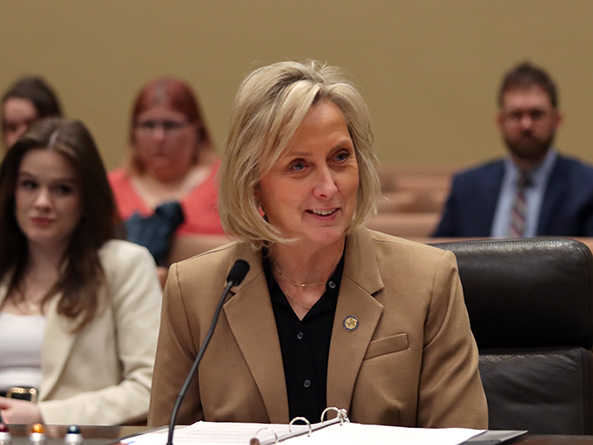Free school meal opt-in requirement proposed
The Education Committee heard testimony Jan. 24 on a bill intended to maximize participation in a federal program that allows school districts with high poverty rates to serve free breakfast and lunch to all of their students.

LB285, introduced by Fremont Sen. Lynne Walz, would require public schools that serve a certain percentage of students in poverty to opt in to the reimbursement program, called the community eligibility provision.
“Removing financial barriers, especially in both rural and urban low-income areas, will help us make sure that some of our most vulnerable children are getting their nutritional needs met,” Walz said.
Although Omaha Public Schools adopted the CEP in 2021, she said, eligible Nebraska school districts have been slow to opt in due to concerns that the program is too burdensome to administer or that it could affect a district’s state aid.
Under LB285, the state Department of Education could waive the requirement if a district shows that participation in the CEP is not “financially viable.” The department would provide technical assistance to those schools to help them adopt the CEP in the future.
Anahí Salazar of Voices for Children in Nebraska testified in support of the bill, saying it would benefit students, families and teachers in school districts with the highest needs. She said research shows that access to free breakfast at school improves students’ academic performance, behavior and attendance rates.
Another benefit of the CEP is that it allows schools to serve free meals to all of their students without collecting financial information from households to prove eligibility, Salazar said.
“When schools are able to offer no-cost meals without the barrier of this additional paperwork, stigma around eating assistance decreases,” she said. “No student has to go hungry because his form or her form wasn’t turned in yet.”
Eric Savaiano of Nebraska Appleseed also testified in support, saying Nebraska consistently ranks last among states in CEP participation by eligible schools. Under LB285, he said, approximately 12,800 additional students would receive free breakfast and lunch at school.
The federal government would reimburse most of the meal costs, Savaiano said, but the bill could result in a small number of school districts having to direct more of their own funding to meals than they do currently.
Schools that adopt the CEP, however, often see increased participation in the free meal programs, he said, which results in an economy of scale that helps districts offset some of those additional costs.
No one testified in opposition to LB285 and the committee took no immediate action on it.


